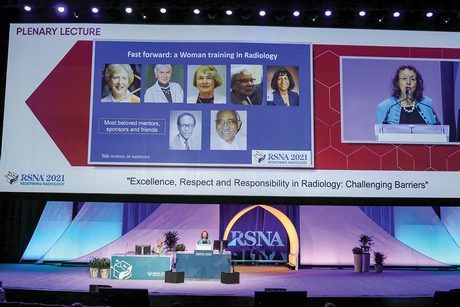
Johnson
“Relying upon one’s strength when confronted by adversity is important, especially when dealing with those barriers that are tangible, and difficult to overcome,” said Michele H. Johnson, MD.
Dr. Johnson is professor of radiology and biomedical imaging and neurosurgery, and director of interventional neuroradiology at the Yale University School of Medicine. When she was appointed professor at Yale in 2014, she was the first Black, female, full professor there, a circumstance she said was a long time coming.
In her Tuesday Plenary Lecture, Dr. Johnson spoke through the language of images to analogize the barriers she encountered in interventional radiology practice to barriers faced in creating an inclusive workplace. She talked about a variety of tactics, like using strength, assistance and creativity for overcoming these challenges. She also shared stories of her career path and important figures who had an impact on her progress along the way.
Persevering Despite Adversity
Dr. Johnson endured racism at an early age and acknowledged the difficulty of remaining strong in the face of difficult barriers. She recalled starting first grade in the first year of desegregation following the landmark Brown vs. Board of Education ruling that established racial segregation in schools as unconstitutional.
Born the only girl and oldest of three children in her family, she said her parents encouraged her to pursue education because it was a strength that could not be taken away. “You can always use your education and experience both to achieve your goals and to navigate when things get tough,” Dr. Johnson said.
Dr. Johnson said another approach when challenges are particularly problematic, is to look to friends, colleagues and mentors for help. She acknowledged several of her early mentors, among them women and men, some of whom were Black professionals who helped her as she pursued her medical education. “A successful academic career seemed achievable for someone like me because they each came before. They set an example for how it could be done,” she said.
In 1983, when Dr. Johnson considered her medical career path, she steered away from private practice because of pregnancy, complications in rotation schedules and other challenges that made the work more difficult for women. Instead she pursued a career in academia where she excelled even as she faced issues as the only women in the room.
Finding the Path to a Good Outcome
Dr. Johnson emphasized the importance of staying true to yourself and striving for excellence despite adversity. She said disappointment can change your trajectory, but can also set you on the course for success. “Even an imperfect attempt at a maneuver can result in a good outcome.”
Returning to the value of mentoring, Dr. Johnson said the experiences of mentoring, whether as mentor or mentee, can be very valuable. “Always try to make a difference, and then when those challenges and barriers come, you have the strength to persevere and to think and to find your way around it, under it, over it or through it — just like a catheter intervention.”

